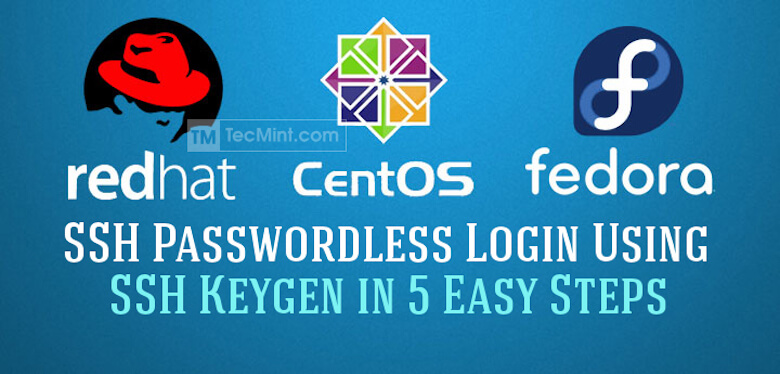SSH Passwordless Login Using SSH Keygen in 5 Easy Steps
| 첨부 '1' |
|
|---|

SSH (Secure SHELL) is an open source and most trusted network protocol that is used to login into remote servers for execution of commands and programs. It is also used to transfer files from one computer to another computer over the network using secure copy (SCP) Protocol.
In this article we will show you how to setup password-less login on RHEL/CentOS 7.x/6.x/5.x and Fedora using ssh keys to connect to remote Linux servers without entering password. Using Password-less login with SSH keys will increase the trust between two Linux servers for easy file synchronization or transfer.
My Setup Environment
If you are dealing with number of Linux remote servers, then SSH Password-less login is one of the best way to automate tasks such as automatic backups with scripts, synchronization files using scp and remote command execution.
In this example we will setup SSH password-less automatic login from server 192.168.0.7 as user picomax to 192.168.1.240 with user hooni.
Step 1: Create Authentication SSH-Kegen Keys on – (192.168.0.7)
First login into server 192.168.0.7 with user picomax and generate a pair of public keys using following command.
Step 2: Create .ssh Directory on – 192.168.1.240
Use SSH from server 192.168.0.7 to connect server 192.168.1.240 using hooni as user and create .ssh directory under it, using following command.
Step 3: Upload Generated Public Keys to – 192.168.1.240
Use SSH from server 192.168.0.7 and upload new generated public key (id_rsa.pub) on server 192.168.1.240 under hooni‘s .ssh directory as a file name authorized_keys.
Step 4: Set Permissions on – 192.168.1.240
Due to different SSH versions on servers, we need to set permissions on .ssh directory and authorized_keys file.
Step 5: Login from 192.168.0.7 to 192.168.1.240 Server without Password
From now onwards you can log into 192.168.1.240 as hooni user from server 192.168.0.7 as picomax user without password.
[출처] https://www.tecmint.com/ssh-passwordless-login-using-ssh-keygen-in-5-easy-steps/
-
Read More
[linux] iptables 명령어 매뉴얼(options)
-
Read More
[doc] TCP/IP 강의 자료 (html)
-
Read More
[linux] 시스템 데몬 종류와 설명
-
Read More
[router] 라우팅 프로토콜 BGP (간단한 세팅)
-
Read More
OSI (Open Systems Interconnection) 개방형 시스템간 상호 접속
-
Read More
[mysql] 시간 관련 SQL구문..
-
Read More
[linux] 프로세스의 stat 상태에 대한 설명
-
Read More
[perl] 영규가 만든 스크립트.. 하하..
-
Read More
[linux] SSH에 대한 기본 설명과 설치/설정
-
Read More
[doc] 레드햇 리눅스 메뉴얼 (html버전)
-
Read More
[linux] 데비안(debian.org) 리눅스 명령어 예제
-
Read More
[unix] AIX쉘 초기 파일 (.cshrc)